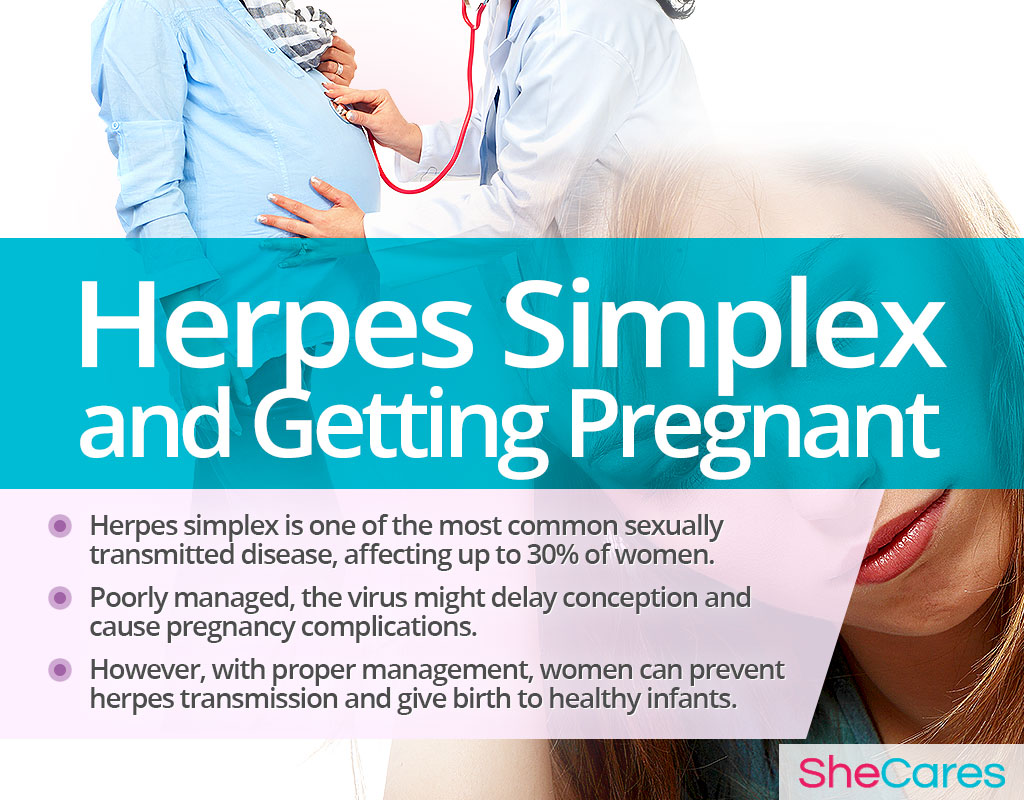Brief Overview of Herpes Simplex
There are two types of herpes simplex virus (HSV):
HSV- 1, known as oral herpes, causes blisters in the mouth area, commonly called cold sores or fever blisters. Most people get HSV-1 during childhood through non-sexual contact with someone who had a blister.
HSV- 2, known as genital herpes, causes blisters in the genital area. Some genital herpes is caused by HSV1 through oral sex.
HSV is transmitted through saliva, genital secretions, or a skin-to-skin contact with blisters during active outbreaks. Sometimes, it can be shed from the skin when no blisters are visible.
Although the first outbreak upon the initial infection tends to be the most severe, the virus can be silent and not produce any symptoms for several years. Currently, there is no cure for HSV.
Possible Effects of Herpes Simplex on Getting Pregnant
Effects of Herpes on Fertility
Herpes has not been found to inhibit female fertility per se. It might, however, decrease the chances of conceiving because couples are discouraged to conceive during active outbreaks, which, in turn, can narrow the fertility window.
Moreover, HSV might reduce male's fertility, which requires serious considerations since it is a sexually transmitted disease that can be passed on between partners.
Effects of Herpes on the Mother and Baby
HSV is most commonly passed on to the baby during labor. It might cause neonatal herpes, which can lead to skin, eye, or mouth infections, central nervous system damage, or disseminated infection.
Mothers with old or recurrent genital herpes develop antibodies that they pass on their babies via the placenta and might lessen the effects of the virus on the baby. Those with a recent infection do not have that protection, which might result in a severe herpes infection in an infant.
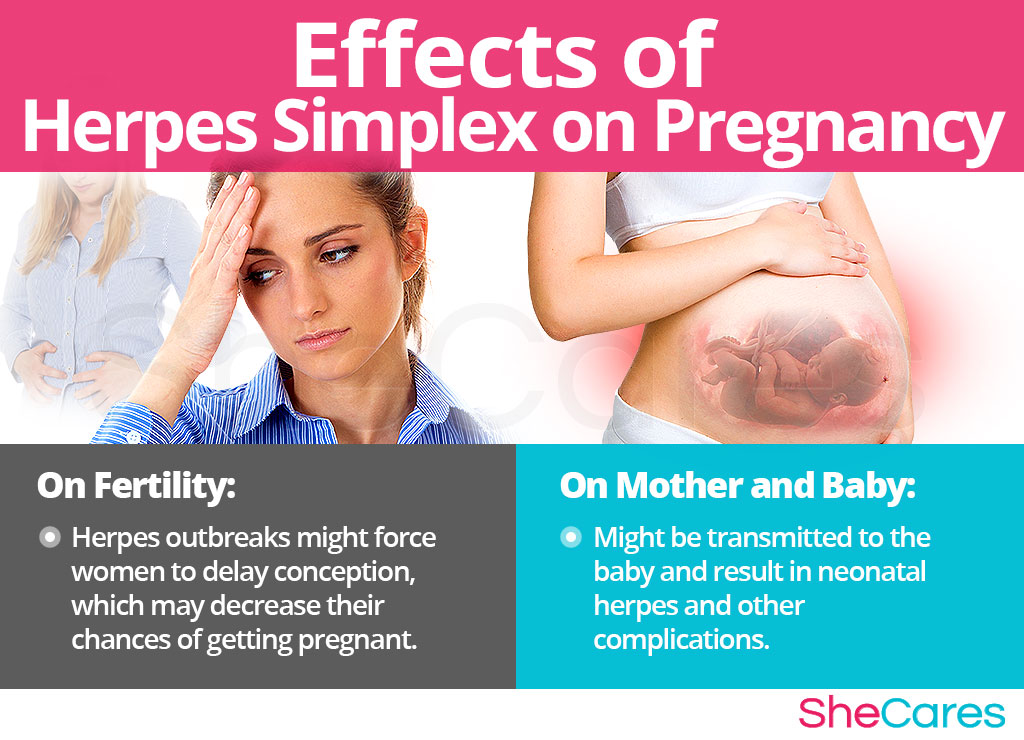
Risks and Complications
An active herpes simplex infection during pregnancy might lead to miscarriage, stillbirth, premature birth, mental retardation, or birth defects.
Action Plan
Control Herpes before Pregnancy
The goal in preconception is to limit herpes outbreaks on the genital area to improve your chances of getting pregnant. Let your doctor know that you have herpes so he can help you prepare for conception.
Treatment
Depending on the severity of your infection, you might be prescribed topical or oral antiviral medications to help you control the outbreaks.
Healthy Diet
Focus on foods that will boost your immune system, prevent outbreaks, and promote fertility. They should contain:
Phytoestrogens, which can regulate your hormones and menstruation: beans, broccoli, and tomatoes
Lysine, which can prevent blisters: apples, beets, and cauliflower
Antioxidants, which can ward off infections and boost your immunity: strawberries, green tea, and ginger
Vitamin C and B, which can reduce stress, boost immunity, and make you more fertile: salmon, mushrooms, and parsley
Citrus bioflavonoids can help herpes blisters heal faster: tea, leafy green veggies, and red clover
Probiotics, which restore your intestinal flora and improve your immunity: yogurt, fermented cabbage, and kombucha
Filtered water with lemon to keep an alkaline balance in the diet
Adequate Exercise
Stress is a known trigger of herpes outbreaks, and exercise is one of the best ways to relieve it. It can also help you regulate your menstrual cycle and boost your fertility.
Opt for 150 minutes of moderate exercise a week, avoiding any strenuous physical activity.
Yoga, pilates, or swimming are excellent choices to stay active and promote stress reduction.
Vitamins and Supplements
Prenatal vitamins with folic acid are necessary in order to prevent pregnancy complications and birth defects.
Hormone-regulating supplements, such as Macafem, will regulate your hormonal balance and boost your fertility.
Lysine supplements might be added if it is not sufficiently consumed in food to prevent herpes blisters.
Good Habits
- Monitor your genital area closely and frequently for signs of a herpes outbreak, such as itching or pain.
- Sleep six to eight hours per night to prevent stress-induced outbreaks.
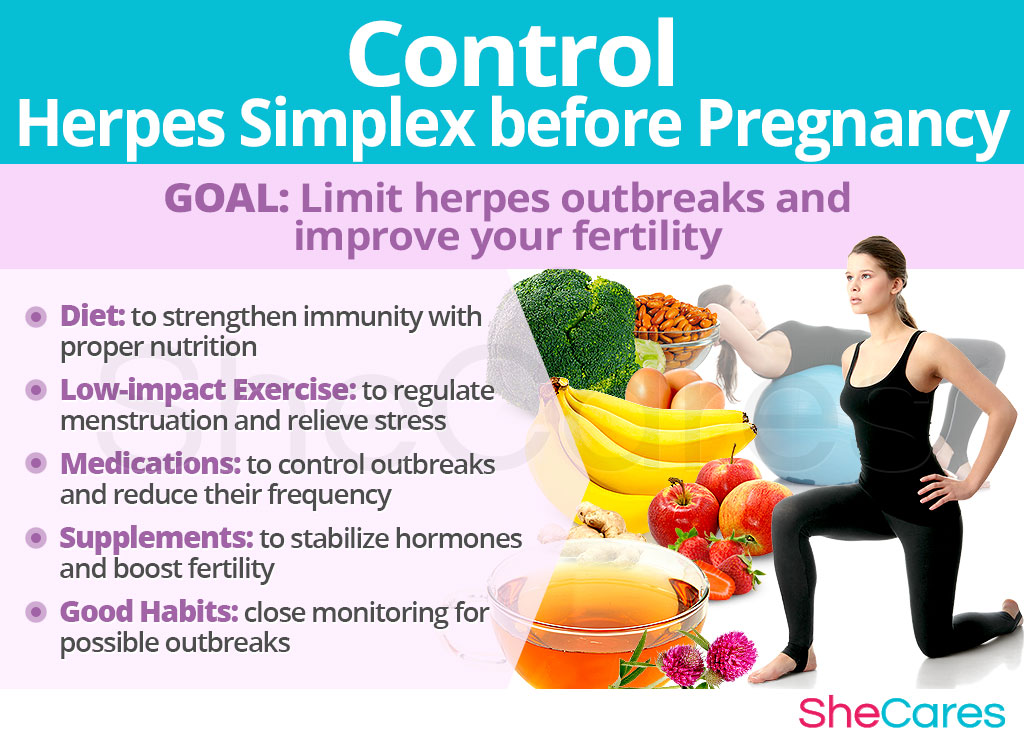
Tips for Conceiving with Herpes Simplex
Ideally, you should attempt to conceive when there are no active outbreaks present in your and your partner's genital areas. Because conceiving with herpes simplex might be stressful, consider the following recommendations:
Add some relaxation-promoting practices to your daily routines, such as music, meditation, or regular walks out in the fresh air.
- Avoid alcohol and coffee as they might inhibit your immune defenses and bring about an outbreak.
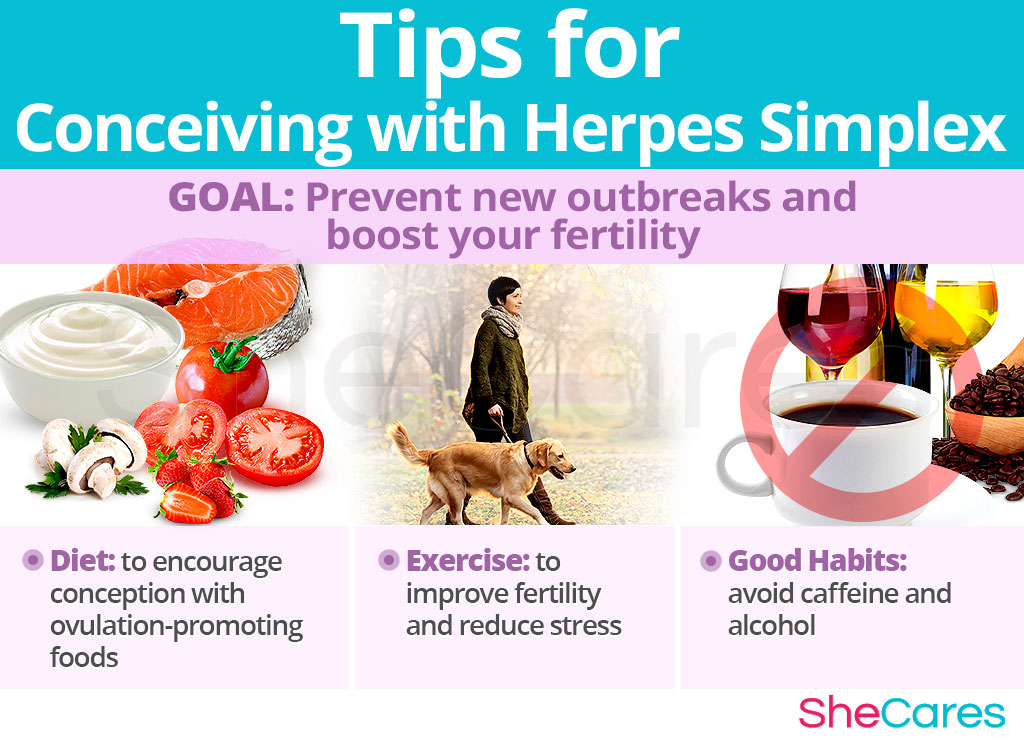
Manage Herpes Simplex during Pregnancy
Be mentally prepared for a possibility of a Cesarean section in case of an outbreak at the time of delivery to prevent the viral transmission.
If your partner has genital herpes, practice safe sex or abstain from it during pregnancy to avoid herpes outbreaks.
You might be given an oral antiviral medication towards the end of your pregnancy (from 36 weeks) to suppress the virus and protect your baby during labor.
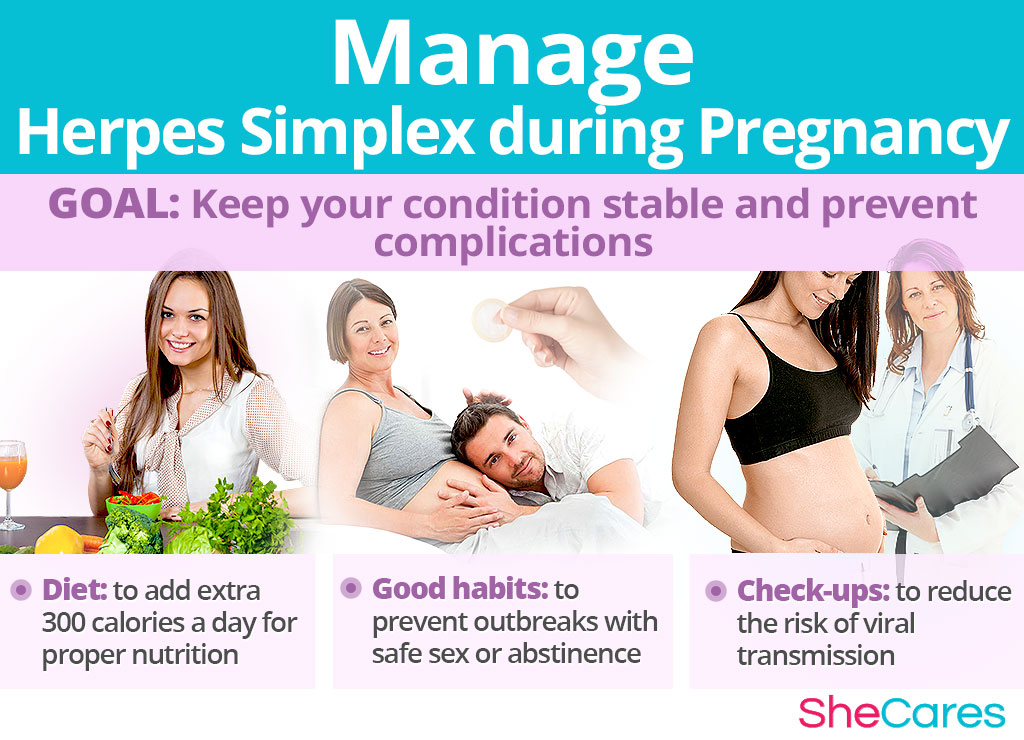
Key Takeaways
HSV pregnancy is understandably a time of stress and worries for many women. Fortunately, the majority of them give birth to healthy babies, even though the risk of passing the virus to the baby is quite high. Rest assured that with certain preventative measures, such as an immune-healthy diet, exercise, and supplements, like Macafem, you can minimize the odds of viral transmission and give your baby a healthy start in life.
Sources
- CDC. (2017). Genital Herpes – CDC Fact Sheet. Retrieved December 18, 2017 from https://www.cdc.gov/std/Herpes/STDFact-Herpes.htm
- Infectious Diseases in Obstetrics and Gynecology. (2012). Herpes Simplex Virus Infection in Pregnancy. Retrieved December 18, 2017 from https://www.ncbi.nlm.nih.gov/pmc/articles/PMC3332182/
- New Zealand Herpes Foundation. (2014). Reassurances about Genital Herpes during pregnancy and birth. Retrieved December 18, 2017 from http://www.herpes.org.nz/patient-info/herpes-pregnancy/
- South Australian Maternal, Neonatal & Gynaecology Community of Practice. (2017). Clinical Guidelines: Herpes Simplex Virus (HSV) Infection in Pregnancy. Retrieved December 18, 2017 from http://www.sahealth.sa.gov.au/wps/wcm/connect/91b9ab004ee4825781368dd150ce4f37/Genital+Herpes+Simplex+Virus+%2528HSV%2529+Infection+in+Pregnancy_PPG_v5.0.pdf?MOD=AJPERES&CACHEID=ROOTWORKSPACE-91b9ab004ee4825781368dd150ce4f37-lNRZxle
- Society of Obstetrician and Gynaecologists of Canada. (2008). Guidelines for the Management of Herpes Simplex Virus in Pregnancy. Retrieved December 18, 2017 from https://sogc.org/wp-content/uploads/2013/01/gui208CPG0806.pdf
- Royal College of Obstetrician & Gynaecologists. (2014). Management of Genital Herpes in Pregnancy. Retrieved December 18, 2017 from https://www.rcog.org.uk/globalassets/documents/guidelines/management-genital-herpes.pdf
- Virology Journal. (2009). Herpes simplex virus infection in pregnancy and in neonate: status of art of epidemiology, diagnosis, therapy, and prevention. Retrieved December 18, 2017 from https://www.ncbi.nlm.nih.gov/pmc/articles/PMC2671497/
